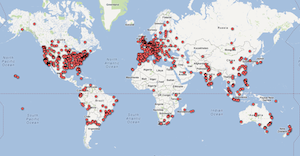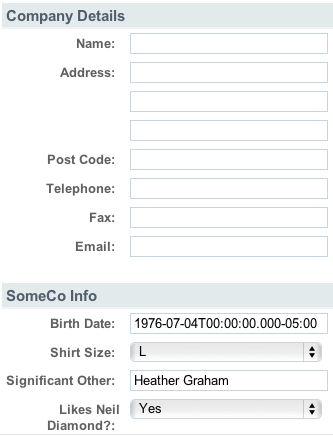I spend a fair amount of time encouraging the formation of local community meetups around Alfresco and, when I can, attending many of these in all parts of the world. Alfresco meetups are especially fun because I get to meet people I’ve previously only known through the forums, IRC, or twitter.
I’ve started to identify characteristics of successful meetup groups. I thought I’d share them here and maybe others will add their ideas to the list.
Set an (interesting, relevant) agenda
Some meetups are staunchly anti-agenda. They exist because it is fun for people in the same or similar profession to get together to socialize. These have their place. For Alfresco meetups, however, I think it makes more sense to have a set agenda for each meeting. Sure, the agenda can have a “socializing” item on it, but I don’t think an Alfresco meetup that is based purely on socializing will last.
It’s also important that the agenda be interesting and relevant to your local community. I can’t tell you what that agenda is. You as a local community organizer should know. If you don’t, ask your attendees. Your attendees might be mostly technical. If so, you may have a code-filled agenda. Or, you might be completely non-technical so your agenda will be about end-user issues and solving business problems with Alfresco. I’ve been to some meetups that have a mix of both, so they start with a general interest topic and then split into technical and non-technical breakouts. The key is to know your group and what is going to work for them.
It shouldn’t be up to you to set the agenda for every meeting anyway. Make it a group effort. Or maybe rotate the responsibility.
Share responsibility
Speaking of that, find ways to get more people involved. A lot of these groups start out because one person is particularly passionate about a topic. That’s fine in the beginning, but look for ways to get others involved. It’s less work and it forms a stronger nucleus when others share the burden of the work that goes into consistently providing a quality meetup on a regular basis.
Provide food and drinks
It’s an easy win. A lot of times these meetings happen over lunch or dinner. Providing something to eat and drink helps people make the decision to come to your meetup when they are torn between their usual lunch spot and your meetup. Plus, pizza and beer are cheap crowd pleasers. Of course not everyone drinks beer so it’s a good idea to have something else on-hand, but you get the point.
In small groups, depending on the makeup, you might rotate refreshment duties. Or, try to get someone to sponsor your group and let them pick up the bill.
Foster connections
One of your roles as a community organizer is to act as a connector. You have a unique insight into each of your attendees’ motivation for attending the meetup so when you see two or more people that can help each other meet their goals make that introduction. The more connections you can make the more likely it is those people will return.
You might also consider setting up a channel for collaboration that can happen between meetings.
Publicize your meetup
Once you’ve set a time and a place for your meetup, you’ve got to get the word out. Many local Alfresco communities use meetup.com but there are alternatives. Regardless of where you host information about your meetup, make sure you are listed on the Local Communities wiki page.
If you are a partner and you are hosting or helping organize the meetup, contact your clients that are in the area and give them a personal invitation. You might even follow up on the day of the meetup to make sure they are coming.
If you let me know about your meetup I can help get the word out by inserting a blurb about it into Alfresco’s “Event Roundup” that goes out each month. I can also tweet about your meetup on my account and Alfresco’s.
I think sending out tweets a week prior, the day before, and the day of works pretty well.
Prohibit hard sales/recruiting pitches
If it turns out that your meetup is just an excuse to sell people your products or services, or people are descended upon by packs of rabid recruiters the minute they walk in the door, you’ll kill any chance you have of building something cool and long-term. No one wants to take time out of their personal schedule to hear a sales pitch. If you are a partner hosting the meetup, pay particular attention to this. People may walk in the door skeptical–you don’t want to confirm their fears with a hard sell.
I’m not saying you shouldn’t mention who donated the space or who paid for the sandwiches. If you want to keep getting free space and sandwiches you’ve got to do that. Just be cool about it. I think giving a sponsor two minutes to talk about what they do while everyone is grabbing a drink is reasonable.
As the meetup organizer it is your job to work with the rest of the group to establish ground rules about acceptable behavior and to swiftly (but professionally) deal with people who act outside the norms of your group.
Pick a central location
I live in Dallas, which isn’t just a city, it’s a “Metroplex”, which, roughly translated means, “No matter where you decide to have your meetup, someone’s going to drive an hour or more to get there.” That can make picking a meetup spot tough.
Especially when you are starting out, look at who’s coming and where they are coming from and try to pick a central location. You can try a different location for each meeting, but I’ve found that you will end up just getting a different set of attendees each time based on where the meeting is. There’s no easy answer. The best advice is to pick a central location, near main arteries and mass transit, make sure your start time comprehends traffic patterns at that time of the day, and make your agenda compelling enough that someone will want to make the journey.
Welcome everyone
It is important that everyone feel welcome at our meetups. This idea of inclusiveness is comprehensive. It covers everything from your relationship with Alfresco (Enterprise customer, Community user, partner, employee) to your demography (age, race, religion, sex, orientation). Everyone shares in the responsibility of fostering a welcoming atmosphere and raising the issue with the group its leaders if something is out-of-line.
Have fun!
Last, your meetup has got to be fun. We all sit in mind-numbing meetings as part of our day job. Why would we want to spend personal time in yet another one? Part of this is about encouraging interactivity. Don’t just have presentation after presentation. Ask the attendees to share short stories about their projects or implementations. Maybe set a common goal to develop an add-on for the community and challenge another local community to do the same.
If you are organizing local community groups around Alfresco and you haven’t yet introduced yourself to me, please do so. I can also hook you into our community of community organizers, which we call Team LoCo (I stole the name from Jono Bacon). And, if you have additional thoughts on what makes a great meetup, please share them in the comments.


